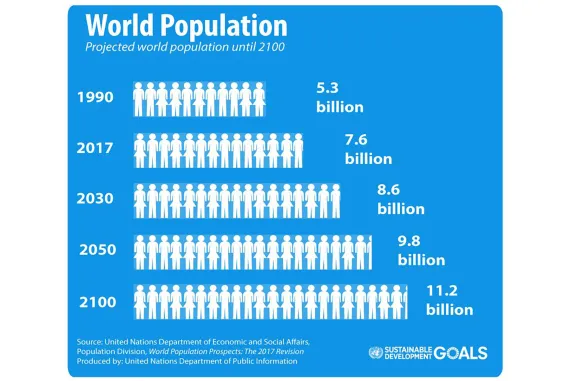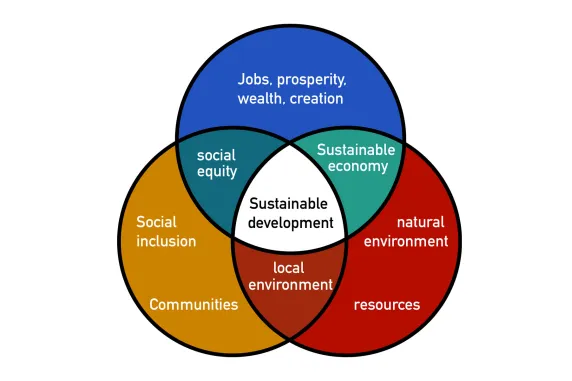Understand sustainability
The United Nations describes Sustainability as the ability to meet the needs of the present without compromising the ability of future generations to meet their own needs.
It has taken approximately 200 years for the world’s population to increase from 1 bn people to 7 bn. It will take around another 100 years for the population to increase from 7bn to 11bn. (source https://population.un.org/wpp/)
The strain on the world’s resources to sustain this many people and their corresponding economic growth is unprecedented.
Historically, world population growth has been supported by technological improvements in areas such as food production and medicine, that have prevented predicted depopulations. However, it is now recognised that developing improvements to each new challenge is not a long-term solution.
(source: https://www.un.org/en/desa/world-population-prospects-2017-revision-global-population)
The UN recognises that the earth has a carrying capacity. The appearance of warning signs such as ocean acidification, biodiversity loss, ozone depletion and climate change indicate that ‘planetary boundaries’, as defined by the UN, are now being reached.
A sustainable future is dependent upon the balance between the economy, environment and society.
Each dimension however, has extensive challenges. A discussion of these challenges is provided on the Future sustainability webpage by CDU’s Professor in Marketing, Steven Greenland.
In 2015, the UN developed the 17 Sustainable Development Goals (SDG) to ‘provide a blueprint for dignity, peace and prosperity for people and the planet, now and in the future.’
The development of Australia towards these goals can be found on the 2030 Agenda for Sustainable Development and the Sustainable Development Goals webpage.
The Northern Territory is the highest emitter of CO2 per capita in Australia, over double that of the next highest, Queensland.
CDU committed to the SDG’s in 2019 with the following vision.
By 2025 Charles Darwin University will achieve local, regional and international recognition as a true champion of sustainability.
CDU will create a brighter future by championing the three pillars of sustainability (Environment, Society and Economy) and the United Nations Sustainable Development Goals.
CDU will become a celebrated innovator in sustainability through its education, research and community engagement – leading the way in:
- Addressing the destructive environmental impacts of human activity
- Inspiring positive outcomes for people, communities and society
- Promoting environmentally and socially responsible business practice and governance
The Times Higher Education (THE) University Impact Rankings places CDU in the top 200 Universities worldwide for our social and economic impact based on the UN Sustainable Development Goals.
Further information on CDU’s strategies and plans can be found on our Governance and strategies webpage and achievements on our CDU achievements webpage. For further information on how Universities can implement the Sustainable Development Goals, please read the guide ‘Getting Started with the SDGS in Universities’ prepared by the Australasian Campuses Towards Sustainability (ACTS)
To develop more understanding about the Sustainable Development Goals, the UN provides free online courses from the world’s leading experts on sustainable development.
Get involved in the development of a sustainable world. Sustainability doesn’t need to be undertaken perfectly; but CDU, as individuals and as a community, has a responsibility to do our part.
What you can do
Change transportation
CDU would like to reduce the number of people driving their car to all of our campuses. As an alternative you could:
- Walk, cycle or take a scooter or motorbike - view our Locations webpages for parking and routes.
- Take the bus
- Organise to rideshare, especially between campuses or to remote campuses.
Why: Using active or public transport decreases your carbon footprint. Walking or cycling also increases your aerobic fitness.
Walk: The NT has the second-highest rate of walking to work in Australia (ABS, 2015). A Casuarina Campus survey in 2014 found that 3% of staff walk to work.
Cycle: The Australian Cycling Participation Survey (2017) showed that 25% of all NT residents ride a bicycle in any typical week but only 9% of staff ride to Casuarina Campus despite 63% of staff living within 10km (2014).
Public Transport: At current occupancy rates for cars, a full bus load of passengers can take more than 40 cars off the road. (Austroads National Performance Indicators.) Based on 2004 occupancy figures for cars and buses the fuel consumption of buses for every 100 passenger kilometres was 2.5 litres and the fuel consumption of cars for every 100 passenger kilometres was 7 litres. A ten per cent shift to bus passenger transport from cars would reduce greenhouse gas emissions by more than 400,000 tonnes a year and every million passenger kilometres on public transport, instead of cars, saves 45,000 litres of fuel. (CRA International, 2006, Impact on the Australian Economy of Increased Bus Patronage, Kingston, ACT.)
Recycle and minimise waste
Decrease and minimise your waste by:
- Bringing to your university campus a lunch box and cutlery, water bottle and for coffee lovers, a reusable coffee cup. Campus vendors will be happy for you to use them.
- Rather than printing or taking notes, bring a laptop or similar device to campus, rather than using paper.
- Separate your waste to assist with recycling as per the waste separation page.
Remember: Refuse, Reuse, Recycle.
Why: It reduces carbon emissions and pollution in the environment.
While waste is more than plastic bottles, in Australia around 75,000 tonnes of plastic drink bottles end up in landfill or as rubbish each year. (Source: http://www.cleanup.org.au) Each bottle will take an estimated 450 years to break down.
In 2006, 60,000 tonnes of greenhouse gas emissions were generated based on the oil needed to produce these bottles.
(Source: Based on a 2006 calculation by the former NSW Department of Environment and Climate Change. The calculation used 2006 AC Neilson information regarding the number of bottles of water Australians bought, and Pacific Institute for Studies in Development, Environment & Security information on how much oil was needed to produce the bottles. Please visit the Story of Bottled Water website for more information.
Manage energy use
There are two aspects to decreasing energy use from non-renewable sources: Energy Production and Energy Consumption.
The University is gradually transitioning its energy use from carbon-based energy sources to clean energy. The CDU community is also decreasing its consumption.
You can help by:
- Ensuring windows and doors are not left open thereby letting out the air-conditioned or heated air.
- Switching off your lights and other equipment when they are not in use.
- Use alternative locations for study or work such as a library or home after-hours or on weekends rather than air-conditioning or heating a building for few people.
- Identifying and alerting appropriate people of energy wastage such as lighting timers not being correctly programmed or buildings not sealed.
Reach out to Property and Facilities or your campus administrator with any concerns.
Why: Managing energy reduces carbon emissions and the environmental damage it causes.
Australia's domestic emissions are currently four times the world's average, and therefore, we are substantially contributing to global warming.
Reduce your water use
You can reduce your water use by:
- Using a refillable water bottle and drinking out of a tap or one of the refillable water stations.
- When drinking from a fountain or using a tap, switch off when the water isn’t required.
- Quickly report or fix leaking taps and toilets. On campus, report via the Facilities Help Desk.
- Be mindful of water use when undertaking work or domestic activities.
Why: Many Australian states are already on water restrictions. Despite Darwin's high rainfall, we are currently using more water than can be captured and supplied in the long term as NT residents are some of the highest water users in Australia. This may lead to the NT being on water restrictions in the future.
CDU has been working with Living Water Smart to decrease its campus water use and we encourage CDU staff and students to also review their use.
Reuse furniture
The University recommends that where possible furniture is reused rather than new furniture purchased. Facilities Management has a limited supply of quality used furniture. Please log a job with the Facilities Help Desk to inquire. Logging a job enables us to track how much furniture is being reused by the University.
Why: Some furniture has a short lifecycle and others have a longer lifecycle. We encourage quality furniture to purchased to decrease furniture turnover and reuse where possible.
Decrease paper use
The University would like to decrease paper use and encourage all staff and students to limit their printing and paper use where they can.
Why: In 2018 the University used 77 reams of paper per working day. That is an estimated 4.6 trees. Every day.
Join a group
There are several groups you can join in with to be involved in that support the CDU Sustainability program:
Envirocollective
Provides a voice for students and staff at Charles Darwin University to advocate for improved sustainability and environmental management of CDU campuses. For more information visit the Envirocollective's facebook page.
Lakeside Drive Community Garden
LDCG is a community garden located at Charles Darwin University Casuarina Campus on a two-acre site on Lakeside Drive in Alawa. The garden is driven by a dedicated team of volunteers and supported by the City of Darwin and the University. For more information, please visit the Lakeside Drive Community Garden's website.
Undertake sustainable events
CDU encourages sustainable events and suggests the following tips:
Event materials
- Register via email to decrease paper.
- Consider carefully the paper handouts provided.
- Provide presentations, readings and other information on a website for participants to access.
- Use recycled paper for name tags and request the return of holders at the end of the event.
- Provide bus and cycle routes as part of the event information.
Catering
- Discuss with your caterer the health aspects and sources of your food. Consider vegetarian options.
- Closely manage numbers to limit waste.
- Use reuseable, recyclable and compostable tableware (CDU's caterers provide this as part of their contracts).
- Provide large containers of water or bubblers rather than individual bottles of water.
- Provide appropriate bins and clearly mark them.
Event management
- Educate your participants about the sustainability expectations at your event.
- Use sustainable decorations and centrepieces where required.
- Include information where appropriate on how the event is meeting sustainability goals.
- Where known, use sustainability related metrics to support event evaluation.
Why:
Large organisations:
- Have buying power that changes the behaviour of suppliers.
- Encourages behavioural change of individuals within organisations that influences behavioural change within society.
- Disproportionally create more waste and pollution and therefore can make a substantial impact by changing behaviour.
Undertake citizen science
Citizen science can be undertaken by anyone, anywhere. These apps help improve our understanding of CDU's campus flora and fauna:

